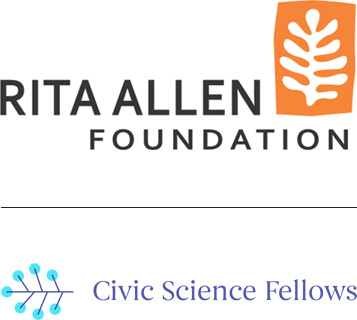Organizational Spotlight

The Rita Allen Foundation:
Making Progress Toward a Culture of Civic Science
Welcome to the new recurring column of our newsletter, where we feature different organizations to acknowledge their impact and contribution to health-related research and its use for practical benefit. We fervently believe evoking change involves creating and nurturing an empowering community—what better way to collectively work towards improving people’s health?
“Research is formalized curiosity. It is poking and prying with a purpose”
Zora Neal Hurston
The Rita Allen Foundation supports emerging leaders by investing in innovative civic science research approaches to foster informed civic engagement. The foundation defines civic science as: “an approach to connecting science and society that emphasizes meaningful collaboration between scientists conducting research and the people whose lives could be impacted by it.” In 2020, the foundation introduced its Civic Science Fellows program to address the need for engaging the broader public using community-based participatory methods to guide how new scientific advancements are developed and utilized. Cultivating a culture built on the value of fostering an inclusive environment for efficacious knowledge development and translation is the fundamental goal of this program.
This program has a multitude of laudable attributes that contribute to its social impact—most notably the ways in which diversity, equity, and inclusion are inherent in the program’s framework. The Civic Science Fellows program displays intentionality about its proximity to equity by amplifying the needs and narratives of communities traditionally underrepresented and disenfranchised in mainstream society. Fellows work alongside a host partner organization for 18-months conducting/synthesizing translational research and leveraging their findings to fortify the connection between science and society. The inaugural cohort of Fellows produced a diverse range of projects relative to key aspects of civic science including utilizing television as a vehicle to improve science literacy in marginalized communities, assessing the implications funders’ biases have on philanthropic giving, developing dynamic collaborations between conventional science stakeholders and constituents, and identifying successful approaches to permeate barriers between communities and current data science practices.
Science unequivocally pervades and thus influences all aspects of society’s sociopolitical landscape. Connecting stakeholders from all sectors within public health provides the unique opportunity for the relationship between science and society to be re-imagined. And because the Civic Science Fellows program is anchored in multi-disciplinary collaboration and shared learning, innovation is ubiquitous—and urgently needed to meet the demands of our 21st-century democracy. A former fellow, Adnaan Wasey, employed his professional expertise as a media producer to establish a studio at WGBH to produce television series about complex socioscientific and sociopolitical issues in a comprehensible way to the broader public.
The second cohort, the 2021-2023 fellows, consists of 35 host and funder organizations and 22 Fellows. This cohort has been charged with the imperative task of exploring civic science as a tool to promote progress and generate solutions to society’s intricate science and technology challenges. The foundation, its partnering organizations, and fellows aspire to nurture a community working collectively to enhance the role of science in the public sphere. The Rita Allen Foundation has decided that remaining distal to the need for civic engagement in science is not an option. Bridging the gap between science and society through engaging diverse emerging leaders in multisectoral and multidisciplinary projects is an innovative approach to long-standing complex challenges, and pioneering this endeavor is a remarkable feat. The future of science is not pragmatic—it’s revolutionary, and the Rita Allen Foundation is an integral part of this meaningful shift.
Please visit https://civicsciencefellows.org/ to learn more.